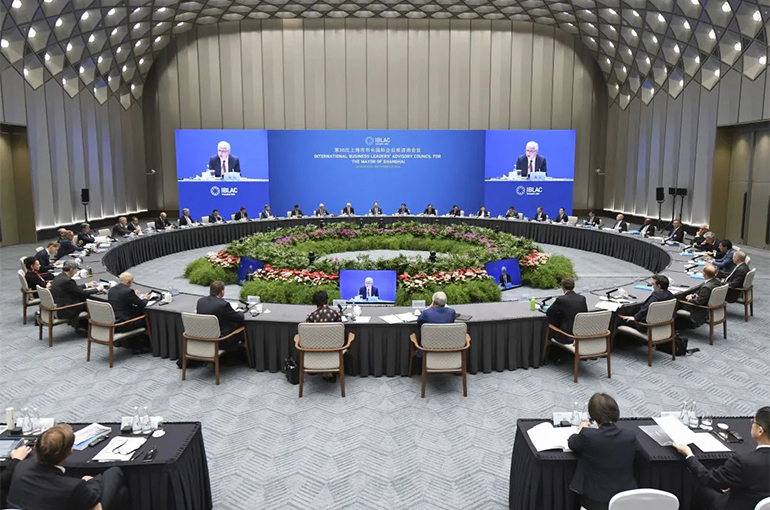 Shanghai to Become Global Innovation Hub, Int'l Business Leaders Say at IBLAC
Shanghai to Become Global Innovation Hub, Int'l Business Leaders Say at IBLAC(Yicai) Sept. 23 -- Shanghai is on track to turn into a leading global center for scientific and technological innovation, according to attendees at the 36th International Business Leaders' Advisory Council for the Mayor of Shanghai.
"Over the past decade, Shanghai has been on an incredible journey, transforming from high-speed growth to high-quality development," Severin Schwan, chairman of Swiss healthcare giant Roche Group and IBLAC, said at the meeting held yesterday.
The IBLAC think tank, themed "Leading Paradigm Transformation, Expanding Opening-up and Cooperation, Advancing Shanghai's International Sci-tech Innovation Center Initiative in the New Era" this year, drew over 30 executives from 13 countries. It has been advising Shanghai's mayors since 1989.
"Openness is key, and Shanghai is leading the way," Schwan noted. "Innovation is key, and that's why Roche has been here since 1926. And, collaboration is key, that's why Shanghai is on its way to becoming one of the leading innovation hubs in the world.
"All of this is even more important in times of geopolitical tensions and uncertainties," Schwan said. "It is exactly in such times that the business community needs to stand up and help build bridges around the globe."
Schwan, who joined IBLAC 15 years ago, expressed confidence in Shanghai's potential to lead global medical research. "In a decade, Shanghai can be at the forefront of global medical research with a thriving biotech sector, state-of-the-art hospitals and research institutions, and a community where preventive healthcare is part of daily life."
Shanghai has a strong scientific and medical resources foundation, noted Antoine de Saint-Affrique, chief executive of French food giant Danone. It can serve as a pilot city for exploring artificial intelligence applications in health care, including personalized health and nutrition, gaining valuable experience, and providing a replicable model across China and globally, he added.
"China is a unique market. It needs more innovation in medical products to deal with the aging population and increasing health care challenges," said Robert Ford, chairman and CEO of Chicago-based Abbott Laboratories. "Shanghai should be an engine of that innovation and we're looking forward to working with city government to further build that ecosystem here."
"Shanghai is a city at the forefront of innovation, where truly remarkable results in technology, decarbonization, and innovation are possible," according to George Oliver, chairman and CEO of multinational conglomerate Johnson Controls. "The Shanghai of 2034 is poised to be the global model for a sustainable and smart city, where cutting-edge technologies like AI are seamlessly interconnected into business and everyday life.
Intelligent buildings will be at the heart of this sustainable and smart ecosystem," Oliver said. "These buildings won't be static energy consumers, but more organic, flexible, and dynamic systems."
"Shanghai is actively promoting green development, whether through new energy development, green mobility initiatives, or eco-friendly mindset and lifestyle," noted Miguel Ángel López Borrego, chairman and CEO of German industrial engineering and steel production firm ThyssenKrupp. It's on the way to becoming a globally recognized green metropolis, he added.
"I hope Thyssenkrupp, with expertise in green transformation, especially in areas like industrial decarbonization and green transportation, could contribute to this journey," Borrego pointed out.
Considering the investment in digital transformation, commitment to international cooperation, and clear vision for the next 10 years, "Shanghai is set to become one of the world's most innovative and most sustainable cities," said Roland Busch, president and CEO of tech giant Siemens.
"A city where EVs are connected to smart grids, where office buildings, and full neighborhoods, are designed and operated using digital twin," Busch noted, adding that AI could allow factories to "increase productivity by 20 percent and decrease carbon emissions just as much."
Emerging technologies present opportunities and challenges, noted Piyush Gupta, CEO of Singapore's biggest commercial lender DBS Group. With the rapid development of AI, generative AI, blockchain, and other technologies, businesses and society are also ushering in new opportunities for reshaping, he added, suggesting that Shanghai could leverage technology's potential and reduce related risks based on its solid technological and digital foundation accumulated over the years.
As global challenges and uncertainties increase, IBLAC is a crucial bridge for international companies to engage in constructive dialogue with Shanghai. The city boasts a dynamic economic environment, a mature industrial landscape, and advanced infrastructure, gradually showcasing its ambition and potential to become a global leader in innovation, according to the entrepreneurs at the meeting.
Editor: Martin Kaiev